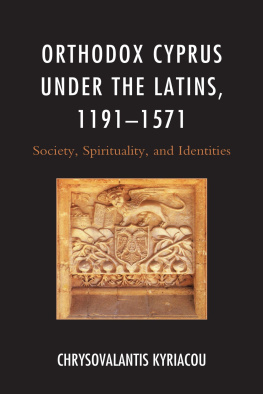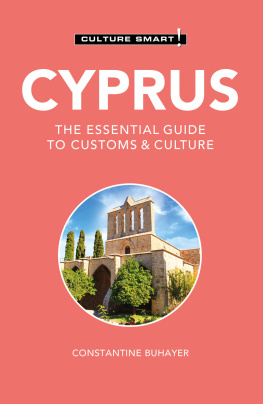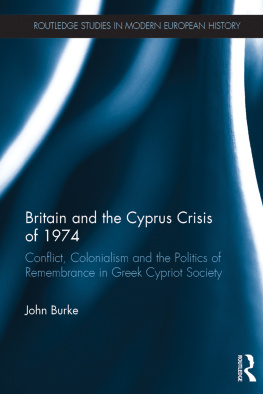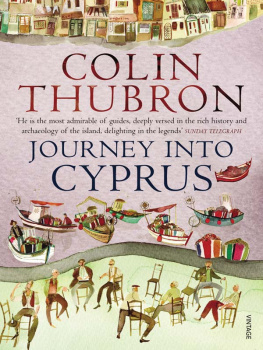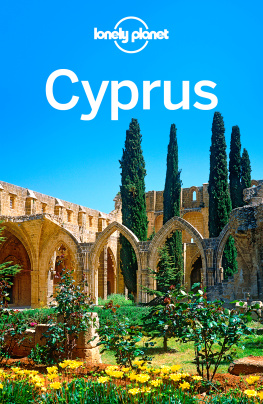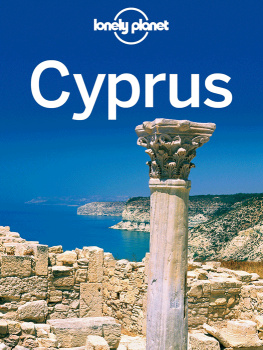Copyright page
Copyright 2020 by Annetta Benzar
All rights reserved. Published by Armida Publications Ltd.
No part of this publication may be reproduced, stored in a retrieval system, or transmitted in any form or by any means, electronic, mechanical, photocopying, recording, or otherwise, without permission of the publisher. For information regarding permission, write to Armida Publications Ltd, P.O.Box 27717, 2432 Engomi, Nicosia, Cyprus or email:
Armida Publications is a member of the Independent Publishers Guild (UK), and a member of the Independent Book Publishers Association (USA)
www.armidabooks.com | Great Literature. One Book At A Time.
Summary:
You are not Cypriot. But I tell them I am. Cyprus is all I have ever known.
What is a Cypriot? Too often the story told of Cyprus makes the island nation seem dully monocultural, or bicultural at best. Yet the life stories Annetta Benzar has collected and retold here celebrate a country that is full of diversity, and in which there is a tale from a different part of the world around every corner. In these pages you will read stories of blood, stories of borders and border-crossings, stories of brides, of fathers, footballers, fear and fate, told by an eclectic cast connected to countries as separate as the United States, the Philippines, the Congo or the Crimea.
As they reflect on the sometimes heartbreaking, sometimes inspiring and sometimes funny experience of living in Cyprus, Annetta Benzar, herself a Cypriot citizen of Belarussian origin, weaves the stories together to form a portrait of a dynamic and fascinating country.
[ 1. SOCIAL SCIENCE / Emigration & Immigration, 2. SOCIAL SCIENCE / Discrimination, 3. SOCIAL SCIENCE / Human Geography, 4. SOCIAL SCIENCE / Refugees, 5. SOCIAL SCIENCE / Anthropology / Cultural & Social, 6. BIOGRAPHY & AUTOBIOGRAPHY / Survival ]
Cover Photographs from Unsplash
Disclaimer:
The views and opinions expressed in this book are those of the individuals featured and do not necessarily reflect the opinions of the Author or the Publisher.
1st edition: November 2020
ISBN-13 (Epub): 978-9925-573-23-3
Introduction
I grew up in Cyprus. Some of the most vivid memories from those early years, besides being dragged (in full tantrum mode) to the beach every day from May to October, revolve around a door. My grandmother, as so many others in our neighbourhood, preferred to leave our front door wide open. This was not a habit she had practiced back in Belarus. There, our doors had two sets of locks that each bragged about their own sets of clicking and grinding sounds, a one two three and a one, two. Closed. I knew that sound. But I never paid it as much attention or thought as when we moved across land and sea to a house where grandmother thought it inappropriate to lock. I used to think it was because she always wanted to be the first to see and know what was going on outside (possibly one of her grandchildren getting up to mischief) or so she could be prepared for this unfamiliar outside world walking into her own. My grandmother, or babushka as I call her, is the kind who doesnt enjoy surprises. Nor did she ever expect anything out of the ordinary to occur in that sleepy part of the island we used to call home. I dont remember ever seeing my grandparents lock up our first house in Cyprus even on the rare occasion when the whole family left the premises. The only keys I recall ever seeing them carry were for the car. Why should we lock the doors? They would say. Its such a pain to go through the whole process of opening it up again. We are in Cyprus now. Everyone was welcome, in their eyes, and there was never any point in trying to keep anyone out. In those days, we used to have many visitors arriving for a cup of tea and draniki, to stay for lunch or for the whole summer break. There was always someone coming in and out of that open door and, however much my mother complained about the dust or dirt flying in from the fields surrounding our house, my grandmother was adamant in keeping that door open. Sun or rain. Sometimes even at night.
In her own way, babyshka was trying to become what she believed was a Cypriot. During her time on the island, she was never able to grasp the local language other than the basics (geia sou, gala, psomi 1 ). Instead, she held onto a different form of communication. My babyshka talked hospitality. She opened her doors because that is what she had read defined the island in the brochure she was given before the whole family uprooted their lives in Minsk, Belarus, and emigrated to this tiny island in the middle of the Mediterranean. She believed the way to her neighbours hearts was in adopting their habits and their character. Her talk was her act the less words she felt she needed and the more she acted the less words she was able to grasp year in and year out.
In many ways, that was our experience of the island. Our neighbours doors remained open and a glimpse of their life inside was always visible if you were to walk by. As if you were part of the going-ons inside their home. But as the years went by, I began to feel uneasy about the doors I felt the outsideness. The vulnerability the threat of an open door signified. Was my neighbour watching as I walked by? Were they waiting for me to walk up the steps to the porch, my foot cross the door sill and, at that very moment, be hit back with the door, closing, A click. A rattling sound. Without a word of warning. Almost a threat. Watching us walk by. Sometimes I wondered whether the doors remained open just so our hosts can push us back out. Quickly. Without a word of warning.
Cyprus history can be described as an unintentional open door. In its 10,000 years of recorded history, it has been occupied and colonised for longer than it has been a sovereign independent state. The Achaeans, the Phoenicians, the Assyrians, the Egyptians, the Persians, the Romans, the English, the Lusignans, the Venetians, the Ottomans. Even today, it remains an island divided between Greek-Cypriots in the South and Turkish-Cypriots in the North as a consequence of the 1974 invasion. The islands mixed history is reflected in its buildings, many of them exposed to the public eye. From its Neolithic archaeological sites and the Venetian Walls surrounding the Old City of Nicosia, to the Islamic Mosques and the Roman monasteries.
The island has become a witness to a fluidity of migration of people offering their own history to the island. Though they were once uncertain, the wave-like motion with which they arrived has transformed into a soil in which they strive to grow their roots. So we as current residents, fellow island sharers, experience a different Cypriot geography. Yet, how different is the Cypriot landscape today compared to that of twenty, thirty years ago. Limassol with its towering luxury apartment buildings that are plastered with banners taking up more space than the road signs. The numerous Asian stores where locals go to buy their rice noodles and tofu, their spices and rice. That one street in the old town of Nicosia that has at least seven barber shops, all with Arabic signs and on another that Armenian quick stop that is always crowded on a Friday or Saturday night with people waiting for some shawarma before drinks. The active mosques. Kofinou Camp. The Red Lanterns for Chinese New Year hanging by the neighbours front doors. The annual Russian-Cyprus Festival, SeptemberFest, the Phillipine Cook-Offs, the Sri Lankan dancers at the annual Spring Festival, belly dancers, the school children gliding between Greek and Russian, Greek and English, Greek and Filipino, Greek and German, Swedish, Hebrew, Romanian, Spanish, Bulgarian, Arabic, Persian, French...


